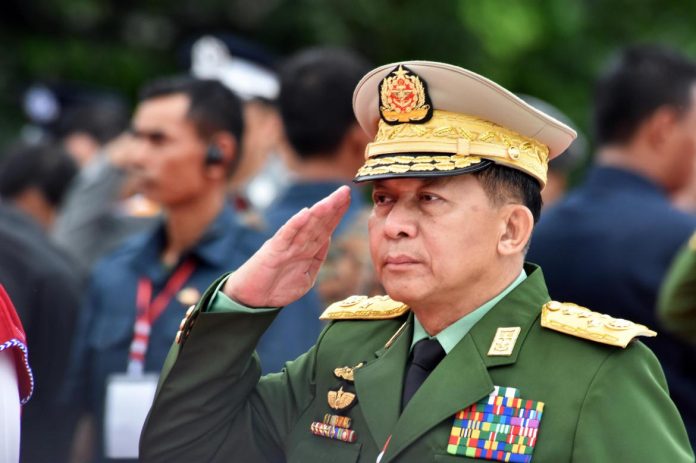Facebook on August 27 banned 20 military-linked individuals and organisations from its platform, including Senior General Min Aung Hlaing. (Steve Tickner | Frontier)
Some say Facebook has overreached, but it’s debateable whether rights to expression and information are being violated.
By OLIVER SPENCER and YIN YADANAR THEIN | FRONTIER
ON AUGUST 27, minutes after a United Nations Fact-Finding Mission accused Myanmar of genocide, Facebook banned 20 military-linked individuals and organisations from its platform, including the commander-in-chief, Senior General Min Aung Hlaing. Debate on Facebook’s decision immediately proliferated online: was Facebook’s decision censorship?
The accusation of genocide comes from a new UN report which says that there is enough evidence to prosecute Myanmar’s senior military leaders under international humanitarian law, and points to specific Facebook posts as evidence of an intention to commit genocide. The UN report also says that the government and military have “fostered a climate” online facilitating incitement to discrimination and violence in which “Facebook has been a useful instrument” for spreading hatred. It said the “Myanmar authorities” had been “promoting … hate narratives” which were used for “explicit calls for patriotic action”.
The right to freedom of expression is not absolute and there are several forms of unlawful speech. Incitement to genocide is the most significant form of unlawful speech and was prohibited under an international genocide treaty that Myanmar ratified in 1956. Incitement to discrimination and violence are prohibited, too.
The question of whether senior military leaders have themselves committed acts of incitement requires a detailed study into their Facebook posts and the context in which they were made. The UN uses a six-part test to define incitement and authors of the UN report say there is ample evidence that will be given to the UN Security Council in September to back up each of its allegations. It appears that Facebook concurs, which is why it immediately deleted 18 accounts and 52 pages just minutes after the launch of the UN report.
Facebook is not a country and arguably therefore does not have a direct obligation under international law to delete incitement. Facebook does have its Community Standards that it claims to enforce. However, the more existential concern to the company is that any country in which Facebook is based, such as the United States, has a legal obligation to hold Facebook liable and prosecute it if unlawful speech is not deleted. This obligation is clearly far more pressing if it concerns incitement to genocide.
Given the speed with which Facebook acted, they were evidently prepared for the UN report to castigate them and had decided that the best course of action was to remove the content in question. The UN report would be a significant source of evidence if proceedings were launched against Facebook, and its lawyers were likely warning of this legal risk – not to mention the risk of global news headlines yet again denouncing the company and its CEO, Mr Mark Zuckerberg.
But in accepting the UN report’s implied allegation that certain posts were unlawful, was Facebook’s decision to take down entire accounts and pages – rather than individual posts containing unlawful speech – a proportionate response? This is important because a disproportionate response would mean that Facebook’s reaction was a violation of military leaders’ right to freedom of expression.
Many free speech activists in Myanmar believe that Facebook’s reaction was a violation. Facebook is such an important public space in the modern world, especially in Myanmar, that a complete ban on people would always be disproportionate. Furthermore, Myanmar’s public have a right to know what senior military leaders think, given how powerful they are in the country.
However, while this argument would be a powerful one in most countries, it is less so in Myanmar. Why? Because Myanmar’s military owns several television stations and newspapers. Establishing whether a person still has the ability and opportunity to express themselves is an important factor in assessing whether a violation of the right to freedom of expression has occurred. In this case, Facebook’s decision will in effect hinder but not prevent senior military leaders from communicating with the public while they have a range of other channels through which to do so. It will also not stop members of the public hearing from them.
Whether or not Facebook’s reaction was proportionate will become clearer in September after the publication of the UN’s full report and the evidence within. It would also be very useful if Facebook could similarly publish any examples of incitement, so that the Myanmar public could understand their decision too.
Hopefully, Facebook’s ban on the Myanmar military won’t overshadow who is really being silenced – critical voices and independent media, exemplified by jailed Reuters journalists Ko Wa Lone and Ko Kyaw Soe Oo.


